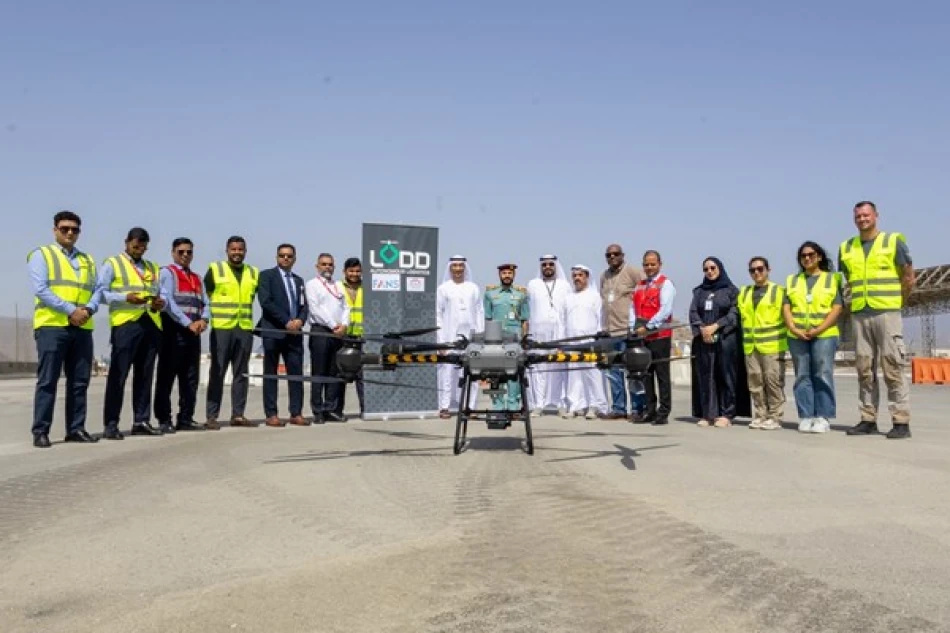
Pioneering Drone Cargo Flights Connect Fujairah Airport and Offshore Platform
UAE Breaks Aviation Ground with First Commercial Drone Cargo Flight from Civil Airport
Fujairah International Airport has achieved a historic milestone by becoming the world's first civilian airport to successfully execute a commercial drone cargo delivery to an offshore platform. This groundbreaking operation signals the UAE's aggressive push to dominate the emerging autonomous logistics market, positioning the nation ahead of global competitors in the race to commercialize drone-based supply chains.
The Historic Flight That Changes Everything
The unmanned aircraft departed from Fujairah's controlled airspace under full air traffic management, delivering cargo to a marine platform off the emirate's coast. This wasn't just a test flight—it was a fully operational commercial mission that demonstrated the viability of integrating autonomous cargo systems into existing aviation infrastructure.
The operation was executed through a strategic partnership between Load Autonomous, a leader in autonomous aerial logistics technology, Fujairah Civil Aviation Department, and Fujairah Air Navigation Services Foundation. The collaboration represents a new model for how governments and private companies can accelerate aviation innovation.
Why This Matters for Global Logistics
Offshore Industry Game-Changer
The successful delivery to an offshore platform addresses a critical logistics challenge that costs the oil and gas industry billions annually. Traditional helicopter deliveries to offshore installations are expensive, weather-dependent, and carry higher safety risks. Autonomous drones offer a solution that operates in conditions where helicopters cannot, potentially revolutionizing supply chains for the Middle East's massive offshore energy sector.
Strategic Positioning Against Global Competitors
While Singapore has focused on urban drone deliveries and the United States grapples with regulatory frameworks, the UAE has taken a different approach by targeting industrial applications first. This strategy mirrors the country's broader economic diversification efforts, leveraging its geographic position between Europe, Asia, and Africa to become a logistics hub for emerging technologies.
Market Implications and Investment Opportunities
The successful test opens significant opportunities for logistics companies, drone manufacturers, and aviation service providers. The UAE's approach of creating regulatory sandboxes for emerging technologies has consistently attracted international investment, from fintech to renewable energy. The autonomous logistics sector appears positioned to follow the same trajectory.
Mohammad Abdullah Al Salami, Chairman of Fujairah Civil Aviation Department and Deputy Chairman of the UAE General Civil Aviation Authority, emphasized that this achievement transforms Fujairah International Airport into a strategic hub for advanced logistics services and sustainable air cargo solutions in the region.
Technical and Regulatory Breakthrough
The operation's success required unprecedented coordination between multiple aviation authorities and private partners. Karam Jalal Al Balushi, Executive Director of Fujairah Air Navigation Services, highlighted that the mission demonstrated not just technological innovation, but the high level of coordination required to execute commercial drone operations in an active civil airport environment.
The flight adhered to International Civil Aviation Organization safety regulations and UAE General Civil Aviation Authority guidelines, establishing a regulatory precedent that other nations will likely study and potentially adopt.
What Comes Next
Rashid Al Mannaei, CEO of Load Autonomous, described the achievement as proving that unmanned cargo flights from civil airports to marine platforms can operate with the highest degrees of efficiency, safety, and scalability. The emphasis on scalability suggests this was designed as a proof of concept for much larger operations.
The UAE's success positions it to export this regulatory and operational model globally, potentially creating new revenue streams from consulting services and technology partnerships. As offshore wind farms expand globally and oil platforms require more efficient supply chains, the Fujairah model could become the international standard for autonomous maritime logistics.
Most Viewed News

 Layla Al Mansoori
Layla Al Mansoori






